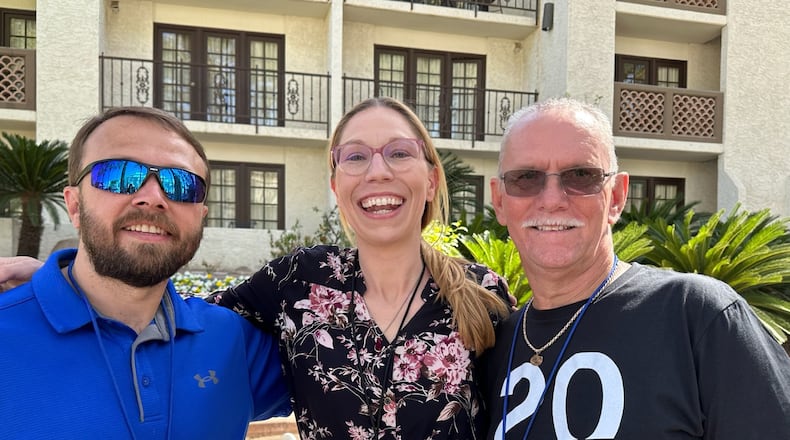Almost a decade after Susan Simpson started podcasting to share what she and others discovered about a murder case that captivated the nation, she’s helped exonerate seven prisoners, including several from Georgia, in her quest for the truth.
Simpson, who lives in Washington, D.C., unearthed critical information in murder cases from her mother’s home city of Rome and other parts of Floyd County. As a result of the work Simpson did for her podcasts, three wrongly convicted men are free after serving a combined 73 years of their life sentences.
“I’m just glad the truth finally came to light after 25 years,” Daryl “Lee” Clark said when exonerated in 2022. “I’m so thankful for the Georgia Innocence Project and ‘Proof’ podcast for what they did. Without them, I would still be in prison.”
Simpson’s work is also one of the reasons that Dennis Perry was exonerated in the 1985 murder of a Black deacon and his wife in a small South Georgia town. In early December, the GBI arrested and charged suspect Erik Sparre in the decades-old crime.
“It was a shock out of the blue,” Simpson said of Sparre’s arrest, which came four years after Perry’s lawyers presented DNA evidence linking Sparre to the crime scene.
Simpson, 39, said proving someone’s innocence is hard, but it’s often the easiest part of correcting a wrongful conviction.
“You need a legal hook,” she said. “You could have all the evidence in the world someone’s innocent, but without a so-called technicality, you’ve got no leg to stand on.”
From serving clients to unraveling cases
Simpson grew up in Buckhead and Sandy Springs. She went to Agnes Scott College in Decatur and got her law degree from George Washington University in D.C.
After several years as a civil litigator, Simpson transitioned into white collar criminal defense.
In 2014, she and millions of other Americans got hooked on the first season of the “Serial” podcast about the 1999 killing of Baltimore high school student Hae Min Lee. Simpson started a blog and continued to research the case after the series ended.
“There was a lot that I was left wanting to know,” she said.
Simpson connected with Rabia Chaudry, a friend of Adnan Syed, who was convicted of Lee’s murder and sentenced to life in prison. They teamed up with South Carolina law professor Colin Miller, who was also researching the case.
After discovering new evidence and other important information, the trio put together their own podcast about Syed, a 2015 series called “Undisclosed.”
“The plan was just to cover that case,” Simpson said. “The first episodes were really rough. We had a lot to learn about sound quality, just the basics of podcasting. But people were interested. They wanted to hear what we had to say.”
New evidence Simpson uncovered about cell tower location data played into the 2016 vacating of Syed’s conviction and his exoneration in 2022.
A ‘bogus’ prosecution brings Simpson back to Georgia
The “Undisclosed” podcasters decided to keep going, to bring attention to other wrongful conviction cases, Simpson said.
They invited suggestions and heard from Clare Gilbert of the Georgia Innocence Project about Joey Watkins, who was serving a life sentence in the 2000 shooting death of a 20-year-old in Rome.
“The more I learned, the more I was interested in learning,” Simpson said. “The case against him was bogus. It was based on rumor and teenage nonsense.”
The podcasters helped unearth misconduct by investigators, flaws in the prosecution and evidence about what really happened.
Credit: Courtesy Red Marble Media
Credit: Courtesy Red Marble Media
Simpson struck gold when she had a coffee shop conversation with a juror in Watkins’ trial who revealed that during a weekend break in deliberations she’d driven the route Watkins was accused of taking the night of the shooting to see if it was feasible.
“I remember when she said that my heart just fell out of my chest, in a good way, but in a shocked way too,” Simpson said. “In the legal world, that is a big deal. Jurors are limited to what they hear in court. They can’t use their own investigation.”
Watkins was granted a new trial, released from prison in 2023 and exonerated when Floyd County authorities abandoned his prosecution.
Moonshine, a ‘hit man’ and a drunken attorney
Simpson’s second Georgia case for “Undisclosed” also centered around a Rome shooting death, though the convicted suspect — a former moonshine bootlegger — had long been out of prison. She said she was drawn to the “wild” story of Gary “Mitchum” Reeves, who was paroled in 1981, six years after being found guilty of murder in his common-law wife’s 1974 death at their home.
That Reeves was convicted after an hourslong trial with a drunken defense attorney was just the tip of the iceberg in a case that kept getting weirder, Simpson said. Reeves claimed in the podcast that his court-appointed lawyer repeatedly asked him for money to buy whiskey and died months after the trial from liver disease.
Simpson said she suspects the parole board released Reeves after learning about his former housemate, a “hit man” called Robert Lee “Bo” Salmon who claimed to have killed Reeves’ wife and was found guilty in a separate murder.
Salmon was promised several thousands of dollars and a lifetime of free rent in exchange for killing a man in Murray County in 1980, the Georgia Supreme Court said when it upheld his murder conviction and life sentence in that case.
Podcasting becomes a full-time job
In 2018, “Undisclosed” aired its season on Perry and the murders of Harold and Thelma Swain at their historic Black church in Camden County. That year, Simpson ceased lawyering to be a full-time podcaster.
She helped discover that Perry’s lawyers were never told another man had confessed to the Swain killings, or that prosecutors paid their star witness to testify.
“That’s a classic example of constitutional misconduct,” Simpson said.
When exonerated in 2021, Perry said he prayed for justice for the Swains, though he’d lost faith in the justice system.
“I am grateful this part of the nightmare is behind me,” he said. “Yet I will deal every day with what happened to me.”
After “Undisclosed” wrapped in 2021, Simpson created a new podcast called “Proof” with Jacinda Davis and Kevin Fitzpatrick, who she had met the year before researching a Michigan case.
Credit: Courtesy Red Marble Media
Credit: Courtesy Red Marble Media
“Proof’s” first season in 2022 saw Simpson return to Floyd County where Daryl “Lee” Clark and Cain “Josh” Storey were convicted as teenagers in the 1996 death of their friend during a game of “Russian roulette.”
Simpson, Davis and Fitzpatrick tracked down the state’s key witness in the case, who left Georgia after testifying. The witness revealed that the lead investigator had sexually harassed her and threatened to have her children taken away if she didn’t falsely testify against Clark and Storey.
The podcasters also uncovered problems with the testimony of another state witness and further misconduct by Floyd County investigators and a coroner who wound up in prison.
Clark and Storey are now suing Floyd County.
“There’s nothing quite like seeing people walk out of prison after being in there decades and knowing that you had something to do with it,” Fitzpatrick said.
Simpson said she’ll keep podcasting for as long as she can.
“I really enjoy the investigative aspect. That’s what drives me,” she said. “I like finding out what happened and the hope, sometimes the ability, to set things right, even in these really old cases.”




